Whether you’re an experienced scuba diver, snorkeling enthusiast or have just discovered the sport of spearfishing and want to become a spearfisher, freediving should be a logical first step in acquiring the fundamental skills and safety requirements needed to maximise your spearfishing experience. In this article we explain why spearfishing and freediving work hand in hand and why freediving knowledge, skills and techniques are going to result in safer and more successful spearfishing.
Why can’t I just take a spearfishing course?
If you want to learn spearfishing, you may not have thought about learning to freedive first. However learning to freedive provides you with the techniques, skills and water confidence to give you longer bottom times, a safer experience, and more fish on your table.
At Go Freediving, we’ve been teaching spearfishing and freediving courses for years and half of our instructors are spearfishers. A spearfishing course is often focused on fish behaviour and identification, guns and gear, and how to hunt. However it’s difficult to fit in the breathing techniques and water skills as well as specific spearfishing techniques and so we always encourage our spearfishing students to take a freediving course first.
We often get enquiries from spearfishers or potential spearfishers that question the point of them taking a freediving course. Here is an example of a typical question we receive regarding spearfishing and freediving:
“I’ve been spearfishing for years, do I really need to do the beginners freediving course? The beginners course may not be beneficial for us as I can already comfortably dive a fair depth? Just wondering.”
A freediving course is not mandatory if you want to try spearfishing. However, if you want to feel in total control of your body, your breathing, your confidence and know that you are performing to the safest and best of your ability a freediving course has the potential to completely transform your experience.
After their course, the same student from above had this to say:
“…Hey, what an incredible day spearing I’ve had. Finally dropped over half of the weight on my belt, put all of the techniques to use, proper breathe up, snorkel out on the way down, I could feel how bent I was and unnaturally going down, so I straightened up like you showed me, perfected my finning to very slow relaxed elegant swoops and seriously never had a more comfortable dive, diving 12m of depth today … it was unreal. So controlled and absolutely incredibly balanced on the bottom, so easy to move around and no fighting my weight to come up…”
Spearfishing and Freediving – The Benefits
Spearfishing and freediving should be synonymous as both involve breath hold diving. However spearfishing courses often focus on the equipment and hunting techniques. If you are planning to pursue spearfishing as a sport, here are just some of the benefits you will gain from taking a freediving course first.
#1 Improving confidence
One of the most important benefits of learning to freedive is the confidence that it gives you in the water. To have this confidence, and to know how your body works and how to breathe, means that when you learn to spearfish, you will progress much quicker and with more comfort. Having this self confidence helps prevent the risk of panicking underwater, especially if you are fighting with a fish or get tangled in your line. The more confident you are, the safer and more enjoyable your spearfishing will be.
#2 Learning how to breathe correctly
On a freediving course you spend a lot of time learning how to breathe correctly and regulate your breath. By learning how to control the breath, it means that you will be much more conscious of how you are breathing – which will have a direct impact on your ability to spearfish efficiently.
One of the most important benefits of learning to breathe correctly is that you will be more relaxed and therefore will not hyperventilate and turn on your sympathetic nervous response. This is the most important reason why you need to learn to breathe correctly as it prevents panic. When you spearfish, you will often feel that the longer you spend on the surface, the less time you have underwater hunting for fish. However when you control your breath and learn to relax and take a better pre-dive breath, the longer you will spend under the water, which will actually result in you shooting more fish.
#3 Learning buoyancy and weighting
One of the biggest issues people face when spearfishing is that they use too much weight. The first thing we do when faced with a spearfisher is to remove most of the weight they are carrying. Novice spearfishers use excess weight as compensation for poor technique, meaning that they don’t even need to do a duck dive in order to start their descent, and finning on the descent is unnecessary. The flip side of this however is that the ascent is hard, and this is the dangerous part of the dive, when your oxygen levels are lowest. And if you are heavily weighted on the surface and lose your air during a black out then you will sink and probably drown. By learning to freedive, you will gain the ability to find the optimum buoyancy for ease vs safety. As your skills improve you will use less weight which in turn will make your spearfishing experience much more flexible as you become able to adapt to any given scenario.
#4 Learning how to fin correctly
Using fins requires leg muscles to work harder. Done incorrectly, air and energy will be wasted and little movement achieved. During a freediving course, you learn body awareness, and how to fin in the most efficient way possible to minimise effort and maximise output. These skills will improve your hunting experience and will conserve energy.
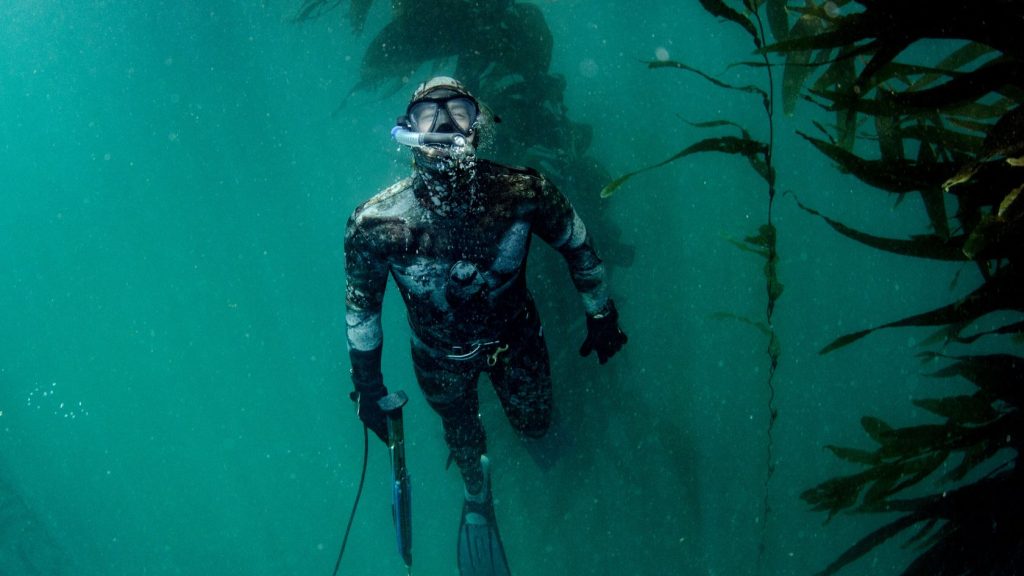
#5 Learning mask and snorkel skills
Learning how to use the mask and snorkel correctly will give you a huge amount of confidence when spearfishing, particularly when you learn your mask off skill, where you ascend from 10m without your mask. Knowing that you can bring yourself back up to the surface from 10m without seeing much is very reassuring. You’ll also learn the reasons why you should never spearfish with a snorkel in your mouth, not only for keeping stealthy in the water, but also for your safety.
#6 Learning how to duck dive and hydrodynamics
Hydrodynamics will teach you how to move through the water as gracefully and efficiently as possible. On a freediving course you how to move with the water rather than against it. Having these skills will prove invaluable when spearfishing. Perfecting a duck dive will also mean you get under the water with minimal weighting and effort, in a way that doesn’t alert or scare off fish.
Spearfishing and Freediving – which spearos have taken courses with us?
Think you’re too good of a spearfisher to take a freediving course with us? We’ve taught world record holding spearfishers from three continents as well as put on specialist safety skills courses for the London International Club. We’ve even taught a few celebrities too:
Find out what other Spearfishers say about taking a freediving course with us
(excerpts taken from our testimonials page):
 “… I have been Freediving/Spearfishing since 1997. I attended Go Freediving at the beginning of last year to do the freediver course to try and improve the reverse equalization problems and my bottom time. By the end of the first weekend I had gone deeper than ever before, my equalization problems were gone and I can now hold my breath for over 5 minutes!!..”
“… I have been Freediving/Spearfishing since 1997. I attended Go Freediving at the beginning of last year to do the freediver course to try and improve the reverse equalization problems and my bottom time. By the end of the first weekend I had gone deeper than ever before, my equalization problems were gone and I can now hold my breath for over 5 minutes!!..”
Matthew Burridge
 “…I’d been spearfishing but I wasn’t seeing an improvement, so I wanted to come on the course to be taught the correct way for safety drills and my breathing. Equalising was a problem of mine, that’s why I wasn’t progressing.
“…I’d been spearfishing but I wasn’t seeing an improvement, so I wanted to come on the course to be taught the correct way for safety drills and my breathing. Equalising was a problem of mine, that’s why I wasn’t progressing.
Benefits; being taught the professional way. If you’re making an error, being taught how to adjust the problem, how to improve. And the safety drills, being taught safety procedures, particularly the buddy system…” Stuart MacDonald

“…Spearfishing is my main interest. I’ve always been interested in hunting and freediving is a logical step for spearfishing. I could just jump in the water, but that would never be safe.
I’ve learned there is so much more to freediving than you would think…I’ve really enjoyed this course and would absolutely recommend it! The last 2 days have been massively informative…” George Kinloch
 “…I saw a video on YouTube of an Australian couple spearfishing and I thought it looked really cool. And as I wanted to do some spearfishing I thought I’d better learn how to actually dive properly before mucking about with a gun. So I had a Google, and there were lots of good recommendations for Go Freediving so I booked the course the next day…”Ashley Martin
“…I saw a video on YouTube of an Australian couple spearfishing and I thought it looked really cool. And as I wanted to do some spearfishing I thought I’d better learn how to actually dive properly before mucking about with a gun. So I had a Google, and there were lots of good recommendations for Go Freediving so I booked the course the next day…”Ashley Martin
 I’ve learnt loads of new techniques from all the different instructors and these things all add up to improving my overall ability.
I’ve learnt loads of new techniques from all the different instructors and these things all add up to improving my overall ability.
I’d recommend this course, because it’s going to make my spearfishing a lot better. That’s going to work really well for me. This course would be really good for spearfishers in particular I think…” James Miller
 “…I wanted to do a freediving course because my brother said I was hopeless! We always go spearfishing and he goes to 30 metres and I’m stuck on the surface. I thought that freediving was all about training and being fit, and expanding your lungs, but it’s about your body learning it can stay under water longer and doing all the things that it can do. It will help with surfing, with wipe outs as I get older I can hold my breath longer.. and it’s going to help with spearfishing…” Anthony Crosskill
“…I wanted to do a freediving course because my brother said I was hopeless! We always go spearfishing and he goes to 30 metres and I’m stuck on the surface. I thought that freediving was all about training and being fit, and expanding your lungs, but it’s about your body learning it can stay under water longer and doing all the things that it can do. It will help with surfing, with wipe outs as I get older I can hold my breath longer.. and it’s going to help with spearfishing…” Anthony Crosskill
 In terms of what we’ve learnt it’s been massive, but it’s the basics though, so now round two is on the cards!
In terms of what we’ve learnt it’s been massive, but it’s the basics though, so now round two is on the cards!
I’d never done a course like this before, so you learn by just seeing your mates, and people around you, and that’s not necessarily the right way. The breathing techniques are totally different, and we understand why now, and that makes a massive difference. And if you enjoy spearfishing, it gels well with that…” Conrad Rademan
 “…I do spearfishing and I wanted to improve my technique. I wanted to go a bit deeper and do it more professionally. And my dad found you. It’s a good start if you want to learn freediving.
“…I do spearfishing and I wanted to improve my technique. I wanted to go a bit deeper and do it more professionally. And my dad found you. It’s a good start if you want to learn freediving.
I learnt about safety and buddy techniques,rescue methods and more techniques like finning properly. I’m now going to be safer in open water, better technique of going down, finning, holding your breath, and what to do in case of an emergency…” Eric Pezone
 “… I was doing spearfishing and I know nothing about safety so the huge reason to come here is about learning the safety with people who have experience and to know how to hold my breath safely and correctly. And also to learn how to help other people, who may have problems when they dive, and to learn to extend my breath hold and get good advice…”
“… I was doing spearfishing and I know nothing about safety so the huge reason to come here is about learning the safety with people who have experience and to know how to hold my breath safely and correctly. And also to learn how to help other people, who may have problems when they dive, and to learn to extend my breath hold and get good advice…”
Ramzi Laugaly
So you want to learn to Spearfish? Learn to freedive with Go Freediving first!
Go Freediving is the longest established, most experienced and friendliest freediving course provider in the UK, led by world class freediving instructor trainer Emma Farrell, and her team of personally trained instructors. No other course provider has such a good instructor to student ratio, safety record and personal touch.
Whether you’re a beginner dipping your toes into the world of freediving, a seasoned pro looking to turn professional, or simply a freediver of any level who wants the best freediving holiday in the world, we’re here for you!
Also check out our online guide, The Beginners Guide to Freediving by clicking here!
Want more from Go Freediving?
Scroll to the bottom of our webpage where you can sign up to our newsletter, find the dates for all upcoming trips and courses, read even more blogs, or connect with us on social media!
See you in the water!

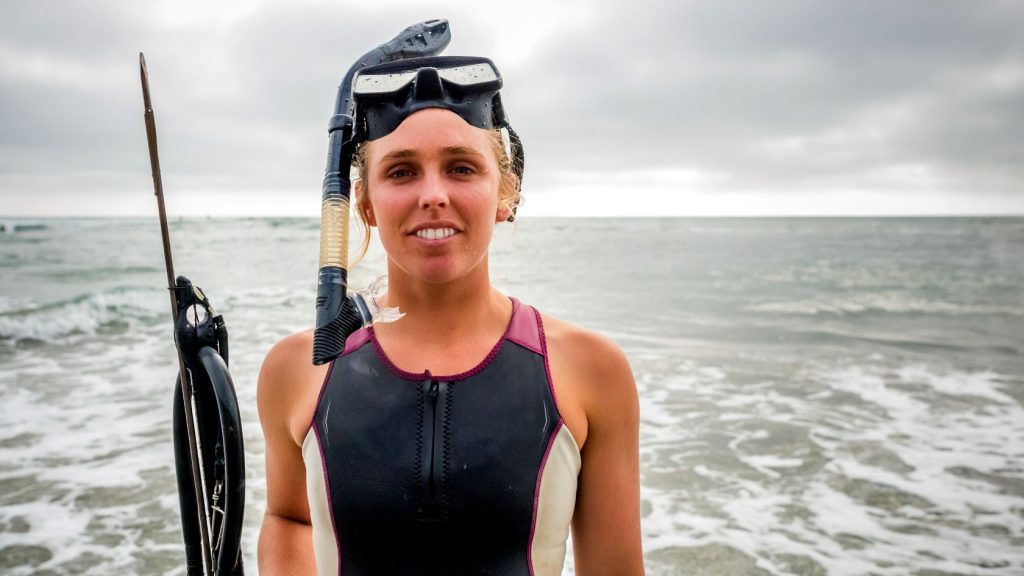
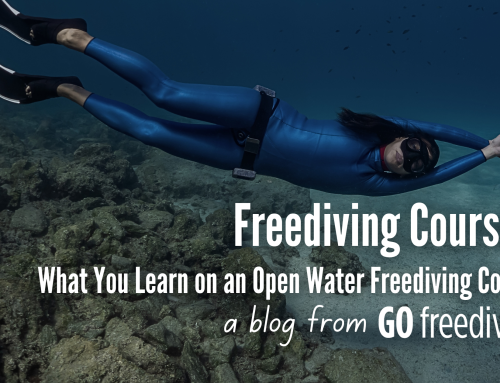
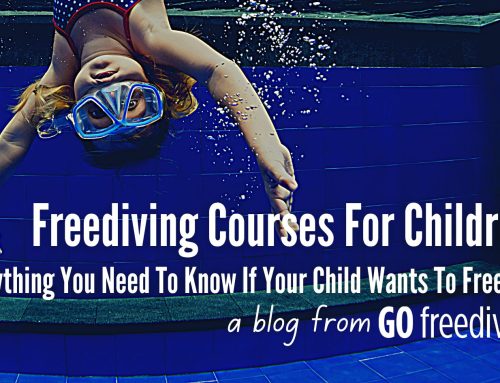
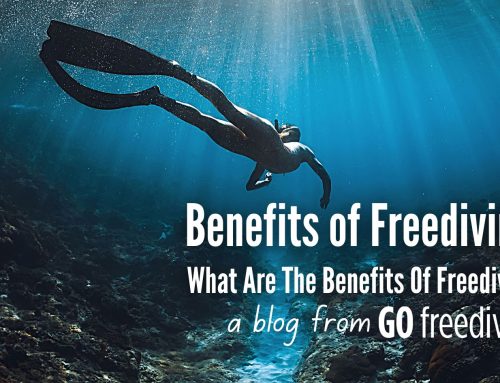
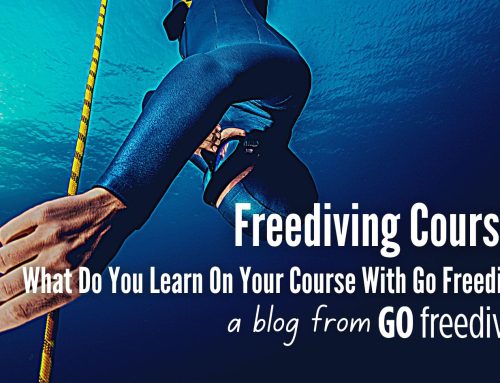
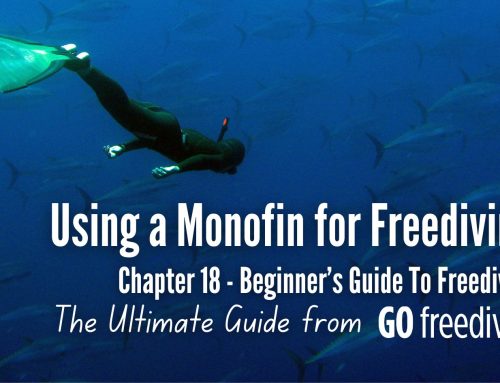
Leave A Comment